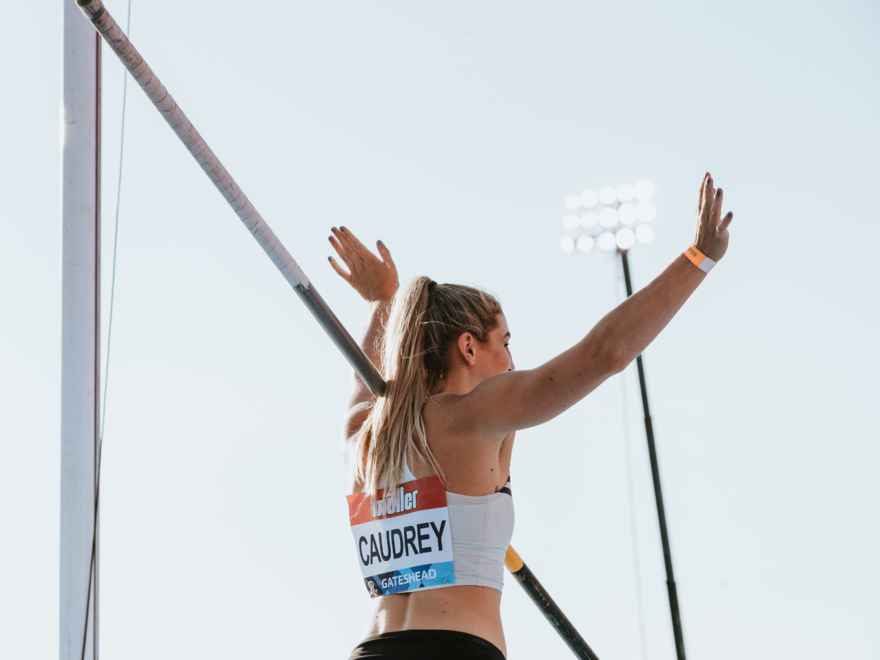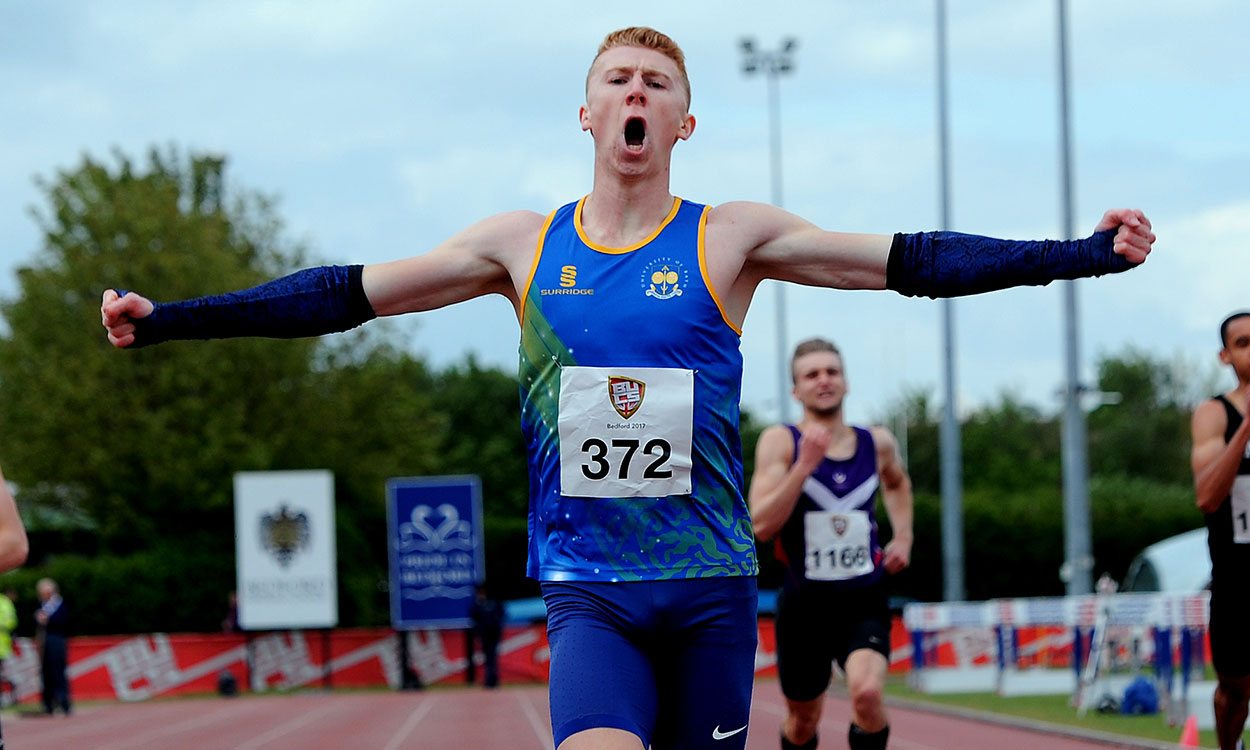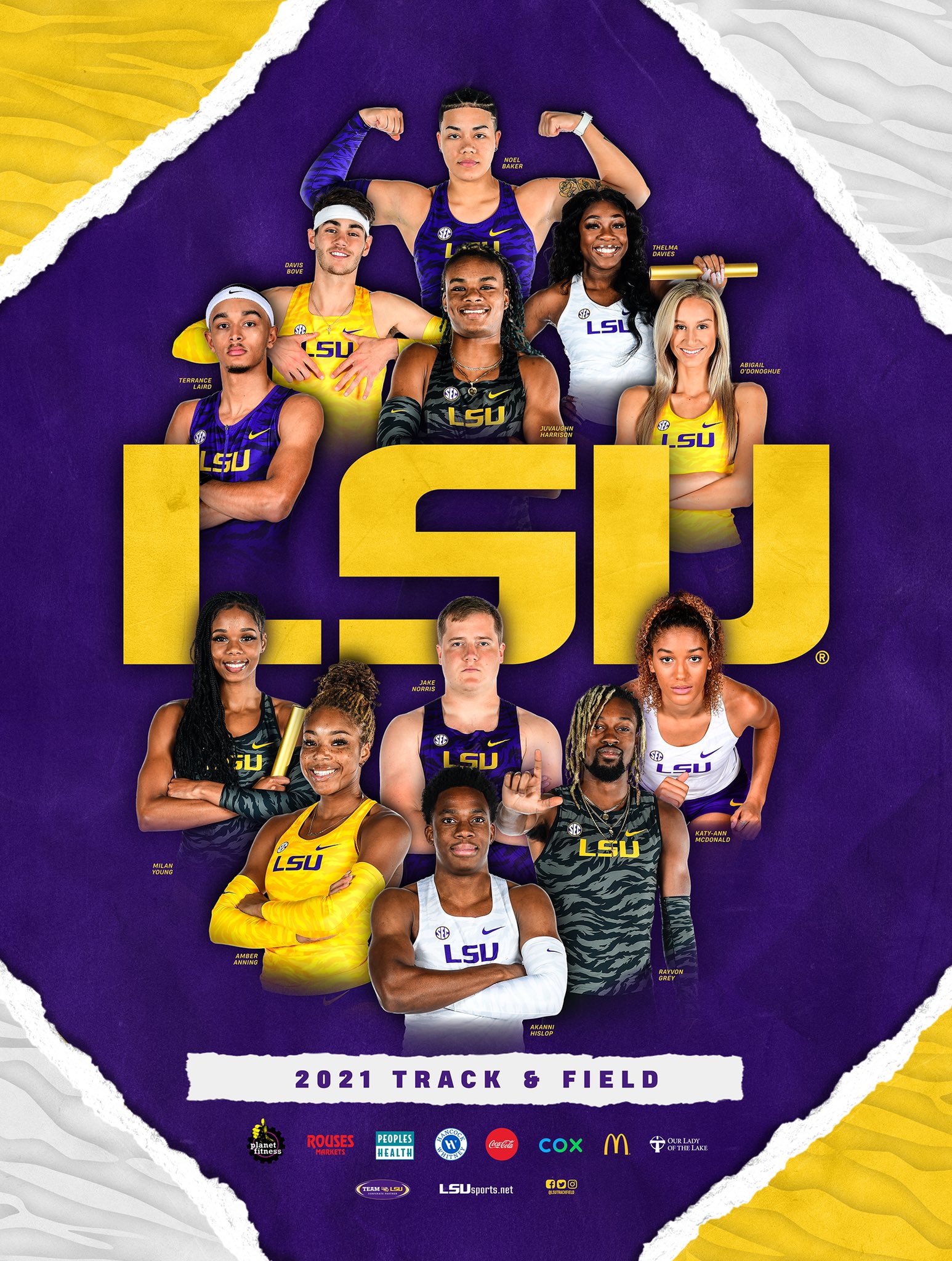
📸 by Jodi Hanagan
Recently, @The Athlete Place conducted a survey on Instagram asking whether athletes would travel to America for University. The result of this was a 63% majority for the ‘yes’ party. As a follow-up, we attempted to get some answers from athletes on the pros and cons of moving to America to further your training, however, the majority of this feedback was negative, which creates an interesting debate. This is a follow up to the article by Catherine Reid who brilliantly detailed her own experiences in the US.
In this particular post, I will be dissecting some of the responses to this question and debating how informed people are about the Track and Field system in the USA. I will not be able to cover every single point so I will be handpicking a few and looking into these in greater detail, otherwise this article would be 40,000 words and no one would read it.
LSU 2021 Track & Field Poster featuring 3 of GB's Hottest Prospects in Amber Anning, Jake Norris & Katy-Ann Macdonald.
“Because I can do the same thing here (UK)”
I feel this is a divisive point. The NCAA Track and Field Programme is indisputably more rigorous and worthwhile than the BUCS programme, with just the one BUCS competition indoors and outdoors for Athletics, compared with the dozens of different Divisions, qualifiers, finals and other NCAA competitions (not to mention being paid to do so).
This will largely come down to the funding for specific institutions, the exact figures for Track and Field funding are difficult to find, the NCAA as a whole, however, had a budget of around $3.5 billion for Collegiate Sport. Compare this with the BUCS association in Britain and in 2019 their total expenditure across the entirety of British university sport was just shy of £5 million.
That difference is staggering to say the least, yet not surprising as I believe it has been felt for some time that British University Athletics has a lot to improve on to reach within an arm’s length of its American Counterpart.
If, however, this statement simply means that you can train to be an athlete anywhere then it is completely true, some people to not need fancy facilities and round the clock attention to become a success, and if you truly want to succeed then people always find a way to train and improve (particularly relevant now given that 90% of the tracks in the UK are closed).
 Cameron Chalmers, Serial BUCS 400m Winner by Mark Shearman
Cameron Chalmers, Serial BUCS 400m Winner by Mark Shearman
“No decathlon coaches in England”
As a decathlete myself, this one definitely hit home. There are very few top-quality decathlon groups and coaches in the UK and the support and coverage of multi events is at the very least, absolutely dire. I believe decathletes and heptathletes would be one of the main beneficiaries of travelling to America for higher education, because although it will be very demanding, you will receive training, injury support and competition opportunities that have never been apparent in the UK. Or so they promise when recruiting.
On an average year in the UK, you’ll have 3-5 indoor multi events competitions and perhaps 8-10 outdoor combined events competitions, leaving very limited chances to qualify to major competitions and forcing multi eventers to spend sometimes large amounts of money travelling abroad in search of better competition. In the US, you will find this many competitions in the space of a couple of weeks, of course it is a much larger country, but the support is clearly far superior to anything available in the UK.
According to successful GB Heptathlete and Ivy League Champion Zoe Hughes, Harvard alumni and current Duke student in the US, the biggest difference between the two systems is financial, with extrinsic rewards and motivations coming to the fore. In the US, she remarks, there is much more financial support and even reward in America, in comparison with the UK, where it’s really just lottery funding from British Athletics, which can be to put it lightly “unreliable”, or private sponsors which you must seek out yourselves or usually have a sizeable social media following.
“Facilities and lifestyle closer to professional”
Following research conducted by The Athlete Place's Instagram, a whopping 95% of almost 200 voters agreed athletics is more professional in the USA. The fact that most universities hand you a box of kit as big as a house when you arrive should tell you all you need to know about the mentality of collegiate sport in America. You won’t have to purchase any kit for years to come by attending college in America. In contrast to this, the support I received as a full scholar at my university in the UK was a vest, hoody, rucksack and water bottle, not quite enough to warrant me not buying any more kit.
The schedule is demanding, with classroom and training attendance very strict, and having to balance the work/practice schedule, sometimes leaving very little outside of this for any form of social life. Professional athletes, however, dedicate their entire lives to this effort and to become the best in any field it has to be your number one priority, so I don’t think a bit of intense training should scare anyone from attending a university in the US. Of course, overtraining is a prominent feature in many driven athletes but being scared of the hard graft is no better, that first set of lactic inducing split 400m’s is going to hit even harder if you’re not prepared for it.
Another interesting factoid from Zoe Hughes, is that because most coaches are professional and your training is essentially their job their presence and maximal effort is guaranteed, which is sometimes not the case with volunteer coaches in the UK. There are also drawbacks to this as Zoe states, “they picked your events, which I didn’t like for a long time, they had control over when I was running and which events”. This would be a huge sticking point for many people, whereas others thrive on the rigidity and the organisation of the system. This ties into another point many were worried about on the polls theathleteplace conducted, injuries.
There is a stigma amongst some athletes that once you travel to the US for college, you will inevitably end up injured due to the pressure of the competition and training schedule. Team GB’s very own Jazmin Sawyers even remarked on the poll she’s not heard good things regarding the way the NCAA handled injuries, backed up by Catherine Reid’s article (click here). Despite all these fears, the physio, treatment, rehab and recovery facilities in the US are incomparable with our own in the UK, so I suppose it is a toss-up between the intensity and risk of getting injured, as opposed to the wonderful opportunity for competition and the potential for improvement in performance with the professional setup.
https://www.youtube.com/watch?v=e9XUf0FGCTs&ab_channel=ESPN
Love or Hate the NCAA, You Can't Deny it is Seriously Entertaining.
In conclusion, I do not believe I am in any way qualified to give iron-clad advice as to whether America is the place for you to travel or not to better your Track and Field career, but as with any life-altering decision, DO YOUR RESEARCH! There are hundreds of colleges in the US each with different set-ups, so if you are considering a trip over there, make sure you find the one which is right for you, and of course, perhaps the most important part, make sure you find the right coach, as a bad relationship with them could curtail your career completely!
America: Where the Grass is Greener or a Murky Swamp Where Athletes Rarely Prosper?
Written by Harry Kendall
If you would like to collaborate, get in touch here, on socials, or at info@theathleteplace.com.



Comments